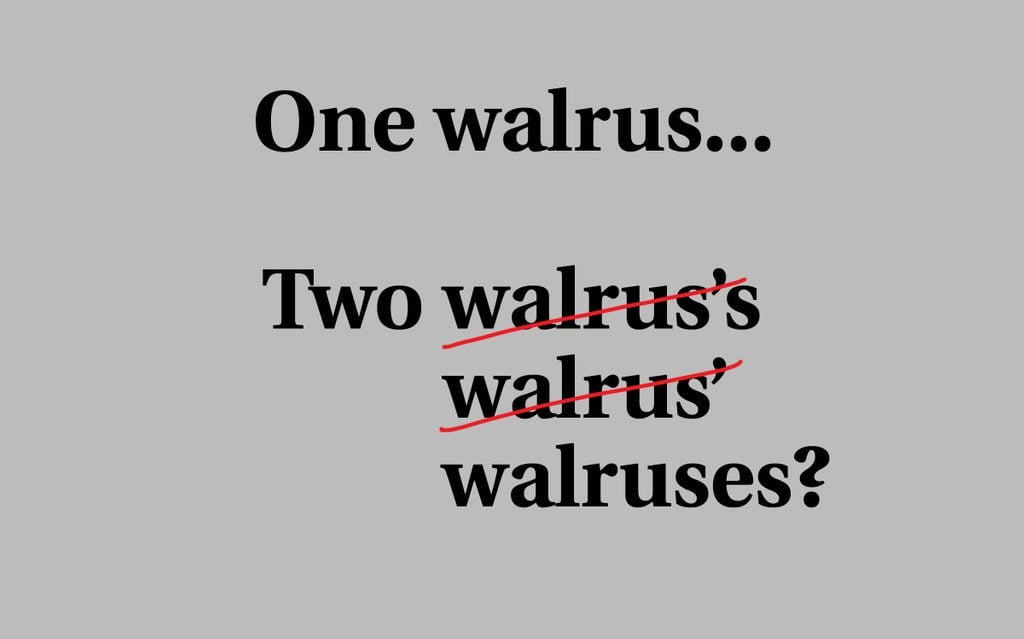Here’s Exactly How to Pluralize a Word Ending in S
Updated: Nov. 23, 2023

And what do you do when it's possessive?!
Almost all English grammar rules come with some degree of confusion, and pluralizing is no exception. For most words, you just add an S on the end, nice and easy. Which would be great—if we didn’t have all sorts of words that take irregular plurals, like “tooth,” “mouse,” “child,” and scores of others. And then there are words that already have an S on the end( like plural last names)—what do you do to pluralize those? Wouldn’t you know it, there’s no one rule for those, either.
How to pluralize words ending in S
For the majority of words ending in S, you just add an -es to the end. “Walrus” becomes “walruses,” “bus” becomes “buses,” “class” becomes “classes.” Not too bad.
But there are some words that, instead of just getting an additional -es, get a different ending altogether. For many words ending in -is, you don’t add -es but change the -is to an -es, as is the case with thesis > theses and analysis > analyses. For some polysyllabic words that end in -us, you remove the -us and replace it with an I. The plural of “cactus” is “cacti,” and “nucleus” becomes “nuclei.” But for others, you don’t. (See the above “walrus” example!) Also, you’ll hear people call more than one octopus “octopi,” following the -us rule, but because of “octopus”‘s Greek roots, its plural is actually “octopuses”! To be fair, though, this rule isn’t super strict. Dictionary.com does list “cactuses” and “nucleuses” as valid secondary plural options for their respective singular words. And, finally, some words that end in S don’t change at all—the plural of “species” is “species.”
How to pluralize names ending in S
My last name is Jones, so I get it. In fact, I once received a Christmas card from far-away family that was simply signed “The Jones,” because of how complicated pluralizing names can be. But when it really comes down to it, it actually isn’t that complicated. The same rule applies that you use for most words ending in S: Add -es to the end. Don’t overthink it! So “Jones” becomes “Joneses,” “Lucas” becomes “Lucases,” etc. And because your name is just that, a proper name, you don’t need to make the spelling alterations that would apply for regular words. For example, if your last name is Harris or Marcus, calling your family “The Harres” or “The Marci” just sounds pretty silly.
But whatever you do, don’t add an apostrophe. Apostrophes don’t make regular words plural, and it’s no different for names. Using apostrophes to make words plural is one of the apostrophe mistakes you might make all the time. When you do use apostrophes, though, is to make words possessive. Which leads us to…
When it’s possessive
What if you want to talk about the tusks on those walruses? (Or just one walrus?) Or how you have a dog-sitting gig for a pooch belonging to the Jameses? In this case, it’s actually the plurals that are simpler. Just throw an apostrophe on the end of the -es: “The walruses’ tusks.” “The Jameses’ dog.” (Or on the end of the irregular plural: “The cacti’s thorns.”) You don’t need to add any letters.
When it’s singular, though, it can be a little puzzling. Do you add just an apostrophe or an apostrophe S? Looking at “the walrus’ tusks,” it just kind of feels like you should add the extra S, especially because just an S-apostrophe is already the format that you use when you’re pluralizing a word that doesn’t end in S: “The cats’ bowls were empty.” To solve this problem, Oxford Living Dictionaries suggests adding an apostrophe-S when, if you were saying the word out loud, you would pronounce the extra S. And, to be fair, this is usually the case. So you would write “The walrus’s tusks were huge” and “The bus’s wheels went round and round.” But sometimes you don’t say the S; for instance, you could write “Wegmans’ parking lot was full” since you probably wouldn’t say “Wegmanses” out loud. But if you’re unsure, you’re probably best off just adding the extra S. Just make sure you have the rules straight for when you should (and shouldn’t) use an apostrophe, because those are pretty hard and fast!



